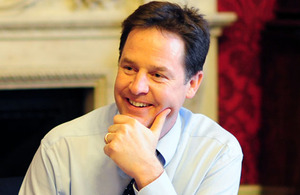Start Up Loans coming to Northern Ireland
Ahead of the British-Irish Council meeting in Derry-Londonderry, the Deputy Prime Minister said Start-Up Loans will be extended to Northern Ireland.

Since it started in England in autumn 2012, the successful Start Up Loans scheme for young entrepreneurs has already committed over £26 million in loans and £4 million in support to help over 5,000 people aged 18 to 30 set up businesses, almost half of whom were previously unemployed.
The Deputy Prime Minister said:
“Start-Up Loans have proven to be a great success in England and we want young people in Northern Ireland to also be able to use the scheme to turn their enterprising ideas into live businesses. Nothing better exemplifies how the United Kingdom can use the best resource at our disposal – our people.
“Following the enormously successful G8 summit in Lough Erne, I am very much looking forward to the British-Irish Council, where we will be discussing other ways in which all of us across the UK can work together to create a stronger economy in a fair society.”
The Business Secretary Vince Cable is working with the Start-Up Loans Company to extend the scheme to Northern Ireland, with an announcement expected within weeks.
The Deputy Prime Minister will be attending the 20th summit of the British-Irish Council (BIC) in Derry-Londonderry on Friday.
This meeting, chaired by the First Minister, Peter Robinson, and deputy First Minister, Martin McGuinness, is only the second time a BIC Summit has been held in Northern Ireland, and the first since July 2007.
The meeting will be attended by leaders and ministers from the eight BIC Member Administrations: the UK and Irish Governments, the devolved administrations of the Scottish and Welsh Governments and Northern Ireland Executive, the Isle of Man Government and the governments of Jersey and Guernsey.
This meeting will focus on the economy, including the impact of energy costs, the UK City of Culture experience, and proposals for a new BIC Creative Industries work sector.
Background on the BIC
The British-Irish Council was created under strand three of the agreement reached at the multi-party talks on Northern Ireland on Friday 10 April 1998 to “promote the harmonious and mutually beneficial development of the totality of relations among the peoples of these islands” and formally established by an agreement signed by the government of the United Kingdom of Great Britain and Northern Ireland and the government of Ireland on 8 March 1999, which came into force on December 2, 1999.
The Members of the BIC are the Irish and UK governments, together with the devolved administrations in Northern Ireland, Scotland and Wales, the Isle of Man government and the governments of Jersey and Guernsey.
The BIC acts as a forum for exchanging information and for discussing, consulting and co-operating on matters of mutual interest within the Council’s respective administrations.
This is the 20th BIC Summit with the Summits rotating between all 8 administrations; the last Summit was held in Cardiff in November 2012.
As part of the St Andrews Agreement in 2006, the British-Irish Council agreed to establish a standing secretariat. This is the fourth Summit since the establishment of the new standing secretariat of the British-Irish Council, based in Edinburgh, which became operational in January 2012.
Notes to editors
The Start-Up Loans programme was created by Lord Young of Graffham to boost enterprise amongst 18 to 24-year-olds across England and bolster job prospects. On 3 January 2013 the Prime Minister announced that the age range would be increased from 24 to 30 and that additional funding of £30 million would be provided in years 2 and 3 of the programme.
The Start-Up Loans programme provides pre-business advice and mentoring that would not normally be available to young entrepreneurs, along with financial support to that would not normally be available via traditional banking relationships.
The programme aims to:
- foster a culture of entrepreneurship in England
- support applicants to create and develop their business
- give a boost to UK economic growth through supporting the development of new businesses
- build-in success for new ventures through the provision of expert advice and support